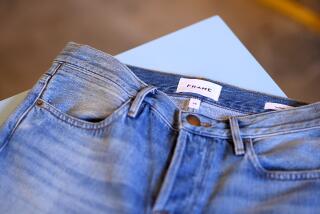Recall of too-sheer exercise pants causes a stir in the yoga set
- Share via
When Santa Monica publicist Kevinie Woo got the word of a looming shortage, “at first I was a little bit panicked.”
The product in question: yoga pants. But not just any yoga pants.
Lululemon Athletica Inc., the purveyor of pricey athletic wear, is warning of a squeezed supply of its signature black yoga pants, form-fitting women’s garments that have developed an almost cult-like following nationwide.
The news came after the company announced it would be recalling thousands of pairs from store shelves because of a manufacturing defect. Customers had complained that the material was too sheer, revealing more than the bendy-stretchy crowd was accustomed to seeing.
“The only workout clothes I buy are from Lululemon,” said Woo, who practices yoga as many as five times a week. “I wish they would have caught it sooner, but at least they were honest about it.”
Chalk it up to the sisterhood of the tree-pose pants — workout fanatics including actress Reese Witherspoon and supermodel Gisele Bundchen have flocked to Lululemon gear in recent years as meditation and stretching becomes an increasingly stylish activity.
The black yoga pants are especially beloved, with reviewers often going to ecstatic lengths to describe their charms. For active women, they’re nearly as ubiquitous as jeans — worn not just to the gym but also to the grocery store and the office. Some believe the pants have near-magical powers to suction in tummies and thighs — like Spanx but more comfortable.
Screenwriter and yoga instructor Hilary Galanoy, 44, of Hollywood said Lululemon is the most popular brand among her students.
“What’s great is that it lasts forever,” she said. “I’ve had some of their things for six or seven years, and they still look good.”
Many fans see the pants as the equivalent of a caramel macchiato at Starbucks: reliable, satisfying and totally worth the hefty price. Lululemon’s Astro yoga pants, for example, are $98 online; the chain has about 30 stores and showrooms in California.
In the Southland, where yoga studios sometimes seem as plentiful as palm trees, Carrie O’Brien, 42, said she’s willing to pay up for workout wear.
“If I can get it at Target for $19.99, that’s great,” the Westwood resident said. “But [if a Lululemon style] makes my butt look smaller, I’ll pay $20 more.”
But the recall — the latest in a series of quality problems for the Vancouver, Canada, company — may have strained the loyalty of some Lululemon faithful.
“You look around, and it’s everybody wearing those clothes, even those who don’t do yoga,” said Erin Henry, 31, a Venice model who was running errands in Santa Monica. “They’ve gone mass market. With companies that expand so quickly, quality tends to go downhill.”
Lululemon said late Monday that it pulled its Luon women’s pants from its stores and e-commerce sites over the weekend after learning about “a level of sheerness in some of our women’s black Luon bottoms that falls short of our very high standards.”
The company is offering customers full refunds for or exchanges of the pants, which make up 17% of the women’s pants and crop pants the chain sells in stores.
The chain said it was still investigating how the batch of too-skimpy pants was allowed to reach stores. Lululemon hasn’t changed its manufacturers or the quality of its material since 2004, it said. The Luon fabric is produced in Vietnam and Taiwan and made with a mix of nylon and Lycra spandex fibers.
The development had the popular retailer downgrading its financial predictions, which worried investors and sent its stock sliding nearly 6% in early trading Tuesday before ending the day down $1.82, or 2.8%, to $64.08.
Lululemon has been riding a surge in demand for fashionable women’s athletic wear, along with competitors such as Gap Inc.’s Athleta brand, Under Armour Inc. and even lower-priced mass-market retailers such as Forever 21 and Victoria’s Secret.
Christian Buss, an analyst with Credit Suisse, calls the sector “simply put, the fastest growing space in the American athletic market.”
But meeting that kind of demand has become problematic for the brand, which tried to raise inventory levels to satisfy clamoring customers, Buss said. Others say the trouble began in January 2012, when founder Dennis “Chip” Wilson retired as Lululemon’s chief innovation and branding officer.
Soon after, customer complaints began flooding the company’s Facebook page. Fan site Lululemon Addict posted a rant, complaining about the lack of new items, radical changes to or discontinuations of popular core products, unraveling fabrics and other poor apparel construction.
Three major hiccups occurred during the year, Buss said. Some involved Lululemon clothing that was too transparent or that featured dyes, such as Paris Pink, bleeding onto other garments, he said.
The outrage led Lululemon Chief Product Officer Sheree Waterson to post a mea culpa on Facebook in July.
“We could make excuses related to being a growing company, new people and more complex processes but we won’t,” she wrote. “Quality is our hallmark. We know we can only grow if we keep our quality and relationship promises.”
This week’s problem, however, “is the first time quality control has really become a significant public issue” for Lululemon, Buss said.
“They’re at risk of alienating their most loyal customers,” he said.
And it’s more than yoga practitioners’ poses being affected; Lululemon said the “issue will have a significant impact” on its financials.
The company had expected an 11% increase in same-store sales and revenue of $350 million to $355 million for its first fiscal quarter. Lululemon has lowered those to a 5% to 8% same-store sales boost and revenue of $333 million to $343 million.
Lululemon stock has plunged nearly 16% in 2013, though it has quadrupled in three years.
The company will report its fourth-quarter and full-year earnings Thursday. Analyst Sam Poser of Sterne, Agee & Leach has already downgraded Lululemon’s shares to a neutral rating from buy, telling investors to back off until quality-control concerns are addressed.
Despite addressing the issue with consumers, Poser said Lululemon should have done a better job soothing Wall Street’s skittishness, perhaps by holding a conference call with investors to respond to “all the conjecture that’s floating around.”
“We don’t know if this is the start of something bad, or how long until the problem will be resolved,” Poser said. “In the meantime, they’ve got me nervous enough to lower my rating and tell everybody to take a timeout.”
Down the line, Lululemon needs to dedicate more employees to quality control in Asia, Poser said.
“It’s a great company, a very fast-growing company,” he said. “But maybe they got a little too comfortable.”
More to Read
Inside the business of entertainment
The Wide Shot brings you news, analysis and insights on everything from streaming wars to production — and what it all means for the future.
You may occasionally receive promotional content from the Los Angeles Times.











